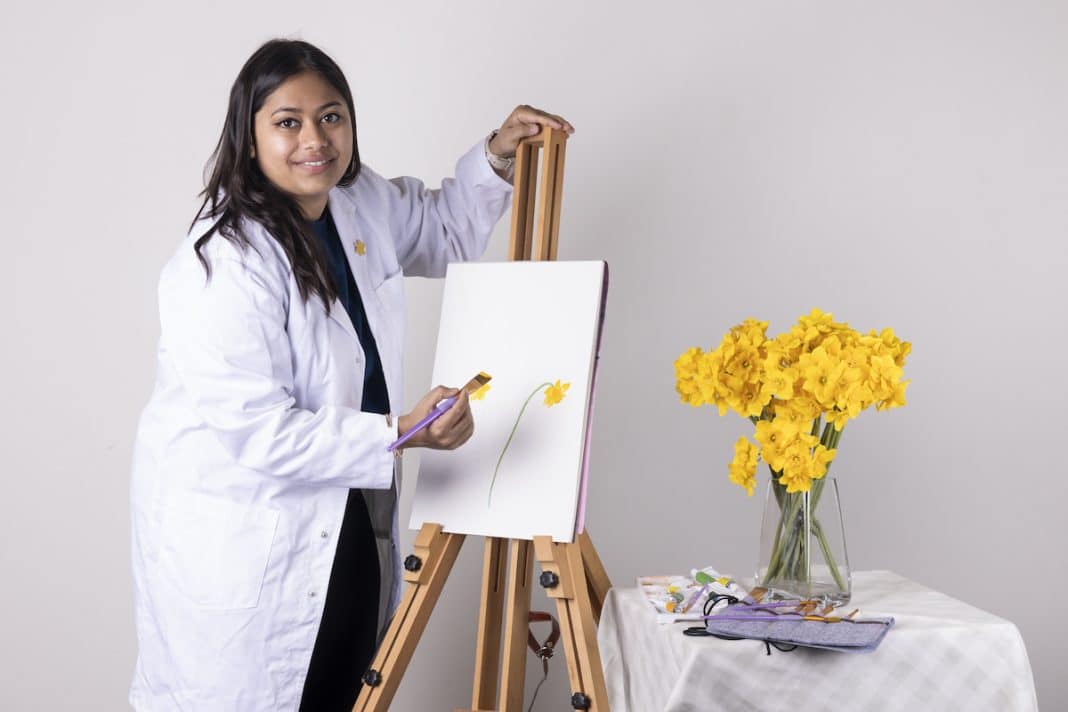2022 marks 36 years of Daffodil Day, which this year falls on Thursday 25 August, with all funds raised supporting vital cancer research.
Cancer Council ACT has invested over $2 million in local, world-class cancer research since 2013, part of a $290 million investment nationwide since 2016.
One 2022 recipient of an ACT cancer research grant is 29-year-old local researcher, Dr Anukriti Mathur. She investigates the role of immune proteins in preventing the third most common cancer in Australia: Bowel cancer.
Anukriti’s story
Growing up in India, Anukriti became fascinated with the immune system that is meant to protect our bodies, but can become the destroyer when out of control, while facing her own autoimmune disease.
“When I was 15 years old, I was diagnosed with Rheumatoid arthritis, a disease that isn’t curable. I was told I would have to stay on medication for the rest of my life,” she said.
“At a very early age, I started shaping my career to understand how the immune system works.
“The immune system is there to protect you every second of your life from invading germs. One of the ways it does this is through a process called inflammation.
“Even in a healthy person, there is constant development of small tumours and polyps, but the immune system can identify and kill those tumour cells. When there’s a problem in the mechanism, the cells develop into full-blown cancer.
“It’s a similar concept behind my disease, where the immune system loses its ability to control inflammation, and that uncontrolled inflammation results in mass destruction in the body,” she said.
“When I was diagnosed, I became fascinated by why that happens, and whether I could contribute to our understanding of how the immune system controls inflammation, and fights cancer.”
“If I could help in deciphering this process, a youngster like me at that time might not have to go through this pain. Because it wasn’t just physical pain, it was mental and emotional trauma as well.”
For years, young Anukriti didn’t understand why her body was in so much pain. Why she couldn’t handle normal activities for a teen – or lift a kilo bag of rice.
“My diagnosis gave me a purpose. Developing new diagnostic markers, or even therapies through my research could help some other teenager to not go through that process.”
Dr Mathur’s research
“We still have a very limited understanding of how the different components of the immune system prevent the development of cancer; the immune cells are trying to target cancer cells and the cancer cells are trying to fight back,” Dr Mathur said.
“The boundaries we’re trying to push through our research is understanding how these immune cells are targeting the cancer cells through a process called inflammation. We know that when that process gets dysregulated, it leads to the development of cancer.
“Bowel cancer, in particular, has limited therapeutic options.” Treatment for bowel cancer is limited to surgery, radiation therapy, and chemotherapy. “So, it’s crucial that we understand how inflammation regulates the cancer before it develops.”
Recently, Dr Mathur’s research has led to an incredible breakthrough, discovering that a protein which repairs DNA also prevents colorectal (bowel) cancer.
“One of the other causes of cancer is DNA damage in the cells. Previous research has found that this protein repairs DNA damage, helping regulate the development of cancer.
“We have now identified that this protein also controls a pathway (the ERK pathway) that leads to inflammation.” The proper functioning of this pathway is crucial to the body not developing cancer.
Dr Mathur’s team is collaborating with a gastroenterologist from Canberra Hospital to identify possible ways the protein could mutate, with the end goal of using that knowledge to create targeted therapies that “cut the root, rather than trim the branches”.
This could mean an entirely new form of treatment for bowel cancer, which an estimated 20,000 Australians were diagnosed with in 2020 alone.
“A lot of research has been done on the DNA repairing protein, and a lot of research has been done on the inflammatory pathway. We have found a connection between the two paths.”
Dr Mathur, for one, is “really optimistic” about a cancer-free future.
“All over the world people are pushing boundaries and trying to find novel therapies that can be more effective in helping patients.
“We will definitely be in a much better position in treating and controlling cancer in 20 years’ time. There’s been so much progress, even right here in Canberra.”
This Daffodil Day, Cancer Council urges Canberrans to remember that all donations go to funding research like Dr Mathur’s, who despite being in the early years of her career, is proving to be a future leader in the field.
As well as putting in the effort for future generations, Dr Mathur notes the importance of acknowledging the impact cancer has on each of us on 25 August.
“All of us at some point in life have either experienced ourselves or seen a loved one be diagnosed with cancer. Daffodil Day is a moment for us all to acknowledge those tough times as family and friends.”
Get the latest Canberra news, sport, entertainment, lifestyle, competitions and more delivered straight to your inbox with the Canberra Daily Daily Newsletter. Sign up here.



